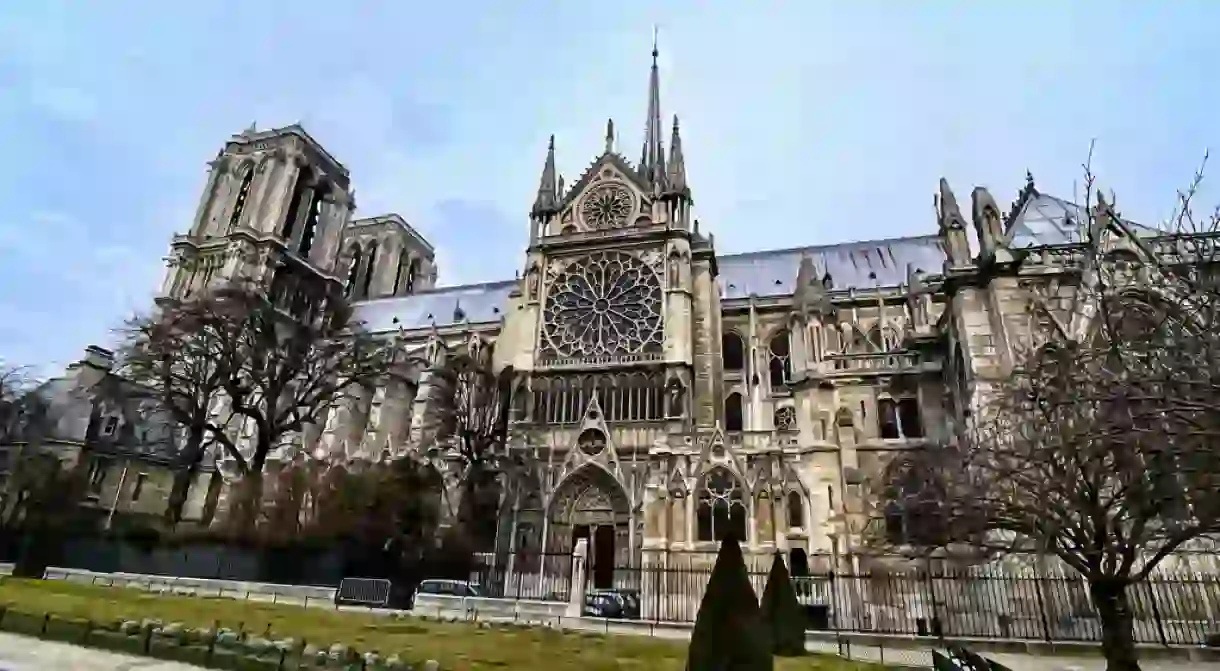Captivating Views Of Paris' Latin Quarter

In the Latin Quarter of Paris, knowledge, creativity, and human endeavor rise up through every ancient corner. This is a neighborhood of intellects and accomplishments. Join us, as we take you on a visual journey through Paris’ oldest and most literary neighborhood.

Crowning the Quartier Latin is the Panthéon, a shrine to and the final resting place of France’s intellectual greats (including Victor Hugo, Voltaire and Marie Curie).
Marianne, the symbol of France and goddess of liberty, awards laurel wreaths to the great minds of literature, science, and philosophy.

Sunshine spills in from above, illuminating the airy hall like thought in the corners of the mind.

The Panthéon looks out over Paris, and nods towards its neighbor, the great Paris-Sorbonne School of Law (pictured right).

Next door, the facade of Saint Geneviève’s Library bears inscriptions of the names of all of the great minds who contributed to the collective body of human knowledge. Can you spot Bacon, Chaucer, Dante?

The ancient church of Saint Étienne-du-Mont nestles at the back of this same square.

It houses the last remaining rood screen in France – these were widely destroyed during the revolution, as they shrouded the activities of the clergy from the curious eyes of the masses.

Down the street, is literary meeting point Place de la Contrescarpe; Hemingway, James Joyce, and George Orwell all lived and wrote here. This is where Joyce finished Ulysses, and the neighborhood Orwell wrote about in Down And Out In Paris And London.

Even the walls here are literary. This wall, on Rue Descartes, is decorated with poet-tree. The poem says, “Philosopher, do you have the chance to have a tree in your street?”

Down the hill lies the sprawling green space of the Jardin du Luxembourg. A labor of love, it took Queen Marie de Medici two decades to build.

Luxembourg is a place to slow down, and enjoy a more relaxed pace of life.

Breathe in the natural beauty.

This splendid garden is just as enjoyable in quiet intimacy of the rain.

Near the Luxembourg, the Musée de Cluny is a repository of the learning of the middle ages.

This is a place where books are gilded and tapestries explore the five senses.

At the Carrefour de l’Odeon, the leaders of the Revolution still stand tall over the passing generations.

And around a crooked cobbled corner, the favorite café of revolutionaries still churns hot chocolates.

St. Michel’s fountain witnessed revolutions too: the May 1968 student uprising turns the country upside down.

Padding the riverbanks are the bouquinistes, book sellers who date back to the 16th century. They line the river on both the Left and the Right banks, and locals say, “The Seine is the only river to run between two bookshelves.”

The thrill of fingering through the feathery pages of old books!

The iconic towers of Notre Dame strike the sky over the Latin Quarter.

At one hundred and eighty-two years in the making, the cathedral is a marvel of back-hunching human endeavor.

Shakespeare and Co. has long been a temple of knowledge and creativity. Its original incarnation lent out books to Hemingway and Fitzgerald, and published Joyce’s Ulysses.

Perhaps the most beautiful timepiece in the Latin Quarter, the Conciergerie’s clock has been ticking since 1370 – a phenomenal work of engineering in a dark and uncertain time.

The stained glass windows of Sainte Chapel soar up to the heavens, where the ceiling is flecked with gold to resemble the stars. The walls themselves seem to disappear into nothingness, giving the place an otherworldly lightness.

The details are even more breathtaking upon closer inspection.

Down in Saint-Germain-Des-Près, art spills onto the boulevard.

The names of the greats are laced into the very streets of the neighborhood!

All this stimulation can leave you feeling ruined.

Sometimes it’s good to take a break from the intellectual frenzy, and entertain the mind by people watching.

Even the greatest geniuses flirted with inspiration over drinks.














